#ecuatorian politics
Text
Countries of the Amazon Cooperation Treaty Vow to Combat Transnational Crime
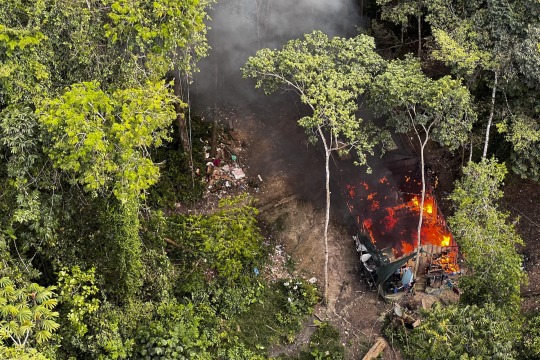
Senior representatives of countries of the Amazon Cooperation Treaty (ACTO) drew up an ambitious plan for the Amazon region in favor of sustainable development, health, and the fight against transnational criminal organizations (TCOs) that exploit the forest for their gain.
Among their latest resolutions, approved during the XIV Meeting of Foreign Ministers of ACTO in November 2023 in Brasilia, was the reactivation of the Commission on Public Security and Cross Border Crime. The special commission will be made up of public security authorities from the signatory countries — Bolivia, Brazil, Colombia, Ecuador, Guyana, Peru, Suriname, and Venezuela — to work on international cooperation to combat TCOs operating in the region.
The foreign ministers also made progress on the proposal to establish the Center for International Police Cooperation in the Amazon, with headquarters in Manaus. The center aims to focus on information, intelligence, and alert exchange; training activities; and combined tactical operations among ACTO countries to eradicate crime. It was also decided to start the process of creating an Integrated Air Traffic Control System, together with the respective competent national bodies, to monitor illegal air traffic and combat drug trafficking.
Continue reading.
#politics#environmentalism#environmental justice#Bolivia#Brazil#Colombia#Ecuador#Guyana#Peru#Suriname#Venezuela#amazon rainforest#brazilian politics#bolivian politics#ecuatorian politics#guyanese politics#peruvian politics#venezuelan politics#colombian politics#surinamese politics#international politics#public security#mod nise da silveira#image description in alt
13 notes
·
View notes
Note
AmazonWatch whats the status there, on their website they say they are all about indigenous rights so im wondering if they are good or bad
Ah yes! I checked them out and they seem solid
but it's still a good thing to keep the donations within national agencies not international NGOs because they have little push in the internal politics of the country, plus they're usually all about international support which is good but this time the burning was caused specifically by brasilian national government policies and our shithead president
AmazonWatch's action is focused on the Ecuatorian Amazon, which isn't the part that's burning at the moment, but the Brasil side
So yeah, donating to AmazonWatch is good in general but in this case it's better to donate to Brazilian agencies!
12 notes
·
View notes
Video
youtube
[Video] Riot Granny hurls stones at the cops
But why?
In early October, a wave of protests swept the streets of Ecuador against cuts in gasoline subsidies and, consequently, rising costs of living. This has become the country’s largest popular uprising in decades. Indigenous marches arrived in Quito, the capital, and occupied the Parliament building; thousands of protesters confronted President Lenín Moreno’s police forces, forcing the government to relocate its headquarters to try to escape the insurrection.
Moreno is the successor to and former vice president of the leftist Rafael Correa, who rode to power on the momentum of the social movements of the 1990s and ruled the country from 2007 on, implementing the same neoliberal model for pacifying and co-opting social movements applied by other left governments in Latin America like the Workers Party (PT) in Brazil. The convergence of various rural, city, student, women, and indigenous groups has contributed to radicalizing a struggle that is now becoming a popular uprising.
On Monday morning, October 14, the Confederation of Indigenous Nationalities of Ecuador announced that the president had backed down and agreed to repeal the decree 883, the austerity bill (known as the paquetazo, package), and replace it with new agreements to be build with indigenous movements. But the Confederation of Indigenous Nationalities of Ecuador (CONAIE) announced that the struggle continues, demanding the departure of the Ministers of Defense and Interior, who were responsible for the violent repression of the protests.
- Libertarian manifest on the Ecuadorian crisis -
The following text comes from the leaflet distributed by the group “Solidaridad Anarquista Ecuatoriana” (SAE) on the streets of Ecuador’s capital Quito.
Libertarian Manifest about the Ecuatorian crisis: SAE with the People
The country lives in times of unrest. Unrest which doesn’t originate in previous Correa government, nor the current one with Moreno. In these two governments, the situation of the country has been concealed, but it cannot be sustained any more.
The STRIKE has spread like wildfire, organized and united under a common cause.
Historical brothers: workers of the city, the peasants, indigenous people, the dissatisfied echo of the students, the unemployed, the homeless and everyone who belongs to the poor class of the country.
Comrade, you have to be very careful, careful not to fall into the hands of opportunists, those who want to use you as cannon fodder to thrust you against the military and the police. The political parties, the Correa’s supporters, the chistian social-democrats, Creo, Moreno’s supporters, they want you first in line to shed your blood so they can take power.
Careful friend, that if we march it doesn’t have to be for a political party. We fight for justice, for the emancipation of the working people. We don’t only fight against the “Paquetazo” but against the neoliberal policies.
Don’t let the people’s fire be extinguished with the spit thrown by the political parties. It’s time for this country to make a revolutionary leap and fight for its emancipation.
Be careful of falling back. Be wary of putting another figurehead in power, even if they call themselves democratic government of the people. In reality, it is dictatorship against the proletariat: another Correa, another Moreno, a Lasso or Nebot.
Let’s share the street, fight and hope with every single of our brothers and sisters of the working people that has gone on STRIKE. It’s time to unite.
FOR THE LAND TO THE PEASANT, THE MEANS TO THE PROLETARIAT, THE EDUCATION AND FREE CULTURE OF QUALITY AND PUBLIC.
IT IS THE MOMENT FOR SOCIAL JUSTICE!
https://www.youtube.com/watch?v=CsYIvOrUKAw
5 notes
·
View notes
Text
Ecuador banned Amazon oil. Brazil's Lula wants to drill
The timing spoke volumes: just as Ecuador announced its historic decision to halt oil drilling in a sensitive Amazon rainforest reserve, Brazil trumpeted its massive fossil-fuel investment plans -- which include oil exploration near the mouth of the Amazon river.

Oil is an increasingly uncomfortable subject for Brazilian President Luiz Inacio Lula da Silva, who casts himself as a climate crusader, but also faces criticism for his plans to grow Latin America's biggest economy with fossil fuels.
Brazil's climate contradictions got a glaring spotlight Monday, after Ecuador announced voters had decided in a first-of-its-kind referendum to halt oil drilling in the biodiverse Yasuni National Park.
"We hope the Brazilian government will follow Ecuador's example... and leave the oil in the Amazon estuary underground," Marcio Astrini, head of the Climate Observatory, a coalition of environmental groups, said in a statement.
Brazil, home to 60 percent of the Amazon, also faced criticism when it hosted a high-profile summit this month on the world's biggest rainforest, where Lula and other regional leaders ignored calls to adopt Colombian President Gustavo Petro's pledge to stop oil exploration.
Just hours after Ecuador's referendum result was announced -- winning praise from climate campaigners worldwide -- Lula's office sent out a press release from the energy ministry touting his administration's plans to invest 335 billion reais ($69 billion) in the oil and gas sector in the coming years.
Continue reading.
#politics#brazil#ecuador#environmentalism#amazon rainforest#ecuatorian politics#brazilian politics#luiz inacio lula da silva#oil industry#mod nise da silveira#image description in alt
14 notes
·
View notes
Text
Despite growing dangers, reporters are finding new ways to report on the Amazon
Targeted by armed groups, criminals and mining companies, journalists are using technology to bring attention to the world’s biggest rainforest
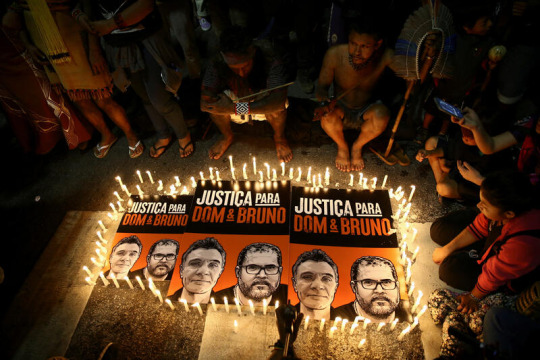
Targeted by illegal logging, mining and farming, the largest and most biodiverse rainforest in the world is under threat. But the journalists and activists drawing attention to the Amazon are also in danger.
The recent killings of The Guardian contributor Dom Phillips and Indigenous expert Bruno Pereira have brought this reality to an international audience. For locals and other journalists reporting on the Amazon, however, the rainforest has always been dangerous. Before Dom and Bruno, the high-profile murders of Brazilian unionist Chico Mendes in 1988 and of US nun Dorothy Stang in 2005 caused outrage worldwide.
Many others disappeared and died without any international attention. A recent report commissioned by the Brazilian Catholic Pastoral Land Commission (CPT) found that 202 people were killed in the Amazon region across Bolivia, Ecuador, Colombia, Perú and Brazil in 2020, 2021 and 2022. The report found that Indigenous people and small farmers in Brazil have been the main targets of violence throughout the Pan-Amazonian region.
I spoke to three members of the Pulitzer Center's Rainforest Investigations Network to find out what it’s like to investigate the Amazon and how they deal with the dangers of drawing attention to illegal activity and environmental damage to the forest in Brazil, Colombia and Perú. Hyury Potter is an Amazon-born and raised freelance reporter. Bram Ebus is a criminologist, investigative journalist and consultant for the International Crisis Group’s Latin American office. Ivan Brehaut is a journalist specialising in covering Indigenous peoples. Here’s how they are covering one of the biggest stories right now.
Continue reading.
#brazil#politics#environmentalism#journalism#colombia#peru#amazon rainforest#ecuador#brazilian politics#colombian politics#ecuatorian politics#peruvian politics#environmental justice#mod nise da silveira#image description in alt
24 notes
·
View notes
Text
Brazil, Argentina and 23 other countries ask US to reinstate tariff exemptions
Twenty-five countries, including Argentina, Bolivia, Brazil, Ecuador and Paraguay, asked the US Congress on Thursday to reinstate a system that allows them to export certain goods without paying tariffs, the Argentine Embassy in Washington announced Thursday.

Twenty-five countries, including Argentina, Bolivia, Brazil, Ecuador and Paraguay, asked the US Congress on Thursday to reinstate a system that allows them to export certain goods without paying tariffs, the Argentine Embassy in Washington announced Thursday.
The Generalised System of Preferences (GSP), initiated in 1974, eliminates tariffs on certain products from developing and low-income countries, but expired at the end of December 2020.
Since then exporters must pay tariffs until the US Congress agrees to renew it.
"We are asking US lawmakers to give the highest possible priority to the GSP reinstatement process, because behind the export figures and the tariffs, there are working families who cannot market their production today," said Argentina’s Ambassador to the United States José Argüello.
Continue reading.
#brazil#united states#argentina#economy#politics#brazilian politics#us politics#argentine politics#bolivia#ecuador#paraguay#bolivian politics#ecuatorian politics#paraguayan politics#foreign policy#international politics#mod nise da silveira#image description in alt
6 notes
·
View notes
Text
From Mexico to Brazil, Latin America's democracies face a common threat from within
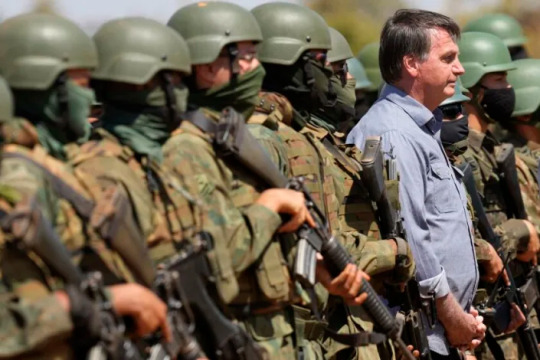
Thirty years ago, Latin America’s nascent democracies did what had once seemed impossible: They confined the militaries that had regularly overthrown them to their barracks.
But now presidents from Mexico to Brazil are coaxing the generals back out — and undermining their democracies in the process. By invitation of elected leaders, militaries across the region are reemerging as a political force: resolving election disputes, putting down protests and taking top government jobs.
In contrast to the region’s Cold War-era militaries, modern Latin American armed forces aren’t governing directly. Often, they’re reluctantly heeding civilian leaders’ calls to wade into politics and governance. But their resurgence nevertheless threatens democracies already beset by election deniers, economic hardship and civil unrest.
Less than a half-century ago, military rule was the norm in Latin America. From Brazil’s 1964 military coup until the fall of the Berlin Wall, generals habitually ousted elected presidents and formed authoritarian juntas, often with U.S. support and in the name of fighting communism. By 1977, repressive military regimes ruled all but four countries in the region.
But by the 1990s, with the lone exception of Cuba, Latin America had embraced democracy. Coup attempts dwindled as military officers accepted civilian rule. In Argentina, junta leaders faced trial. In Chile and Guatemala, where militaries clung to control of some government agencies and offices, elected leaders slowly but surely reformed them. It was a rare and remarkable story of democratic progress in a region with a long history of uncertain rule of law.
But once militaries are firmly under civilian control, it’s up to civilians to manage them responsibly. Most of Latin America’s elected leaders failed that test.
Continue reading.
#brazil#mexico#politics#democracy#chile#ecuador#honduras#nicaragua#el salvador#bolivia#venezuela#peru#military#armed forces#brazilian politics#mexican politics#chilean politics#ecuatorian politics#nicaraguan politics#salvadoran politics#bolivian politics#venezuelan politics#peruvian politics#honduran politics#mod nise da silveira#image description in alt
6 notes
·
View notes
Text
Latin America’s Parliamentarism Problem
Legislatures are gaining more power across the region—but the outlook for governance doesn’t look good.
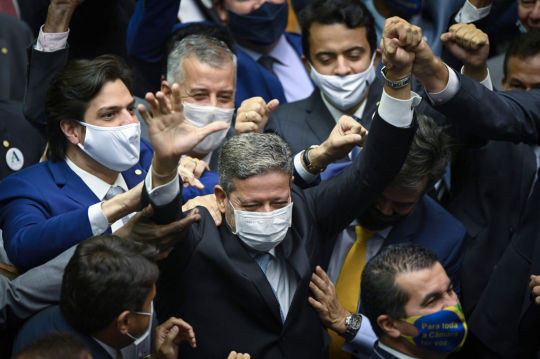
Since populist Jair Bolsonaro won office, one of Brazil’s institutions has come to dominate the rest. No, it’s not the presidency—it’s Congress. In June, lawmakers obtained $910 million in discretionary funds from the “secret budget,” an opaque pool of government funds Bolsonaro exploits to buy legislative support and stave off the threat of impeachment. And that was just the latest move Brazil’s Congress made to grow its power.
Think that makes Brazil an outlier? Think again. Across Latin America, legislatures increasingly tend to hold the cards, while presidents find themselves on the back foot, forced to cut unsavory deals with lawmakers in order to survive. On the whole, the region’s democracies have begun to look and act like parliamentary systems, with legislatures wielding substantial power over the executive branch.
You could call it underground parliamentarism. And though it might seem like a healthy reboot for a region that was long a breeding ground for strongman presidents, the reality is more complicated. Done well, parliamentary systems have much to recommend them: They generate inclusive multi-party coalitions that can diminish polarization. They also allow lawmakers to reshuffle cabinets and replace executives as often as the public demands, opening a pressure valve sorely missing from presidential systems. No wonder political scientist Juan Linz, a longtime observer of Latin America, hoped for parliamentarism to catch on in the region.
Now, Linz’s wish has come true—but not the way he hoped. There are at least three ways Latin America’s presidential democracies increasingly look and act like a broken version of parliamentarism.
Continue reading.
#brazil#brazilian politics#politics#peru#chile#guatemala#colombia#ecuador#peruvian politics#chilean politics#guatemalan politics#colombian politics#ecuatorian politics#mod nise da silveira#image description in alt
3 notes
·
View notes
Text
Bolsonaro meets with leaders of Ecuador and Poland in New York
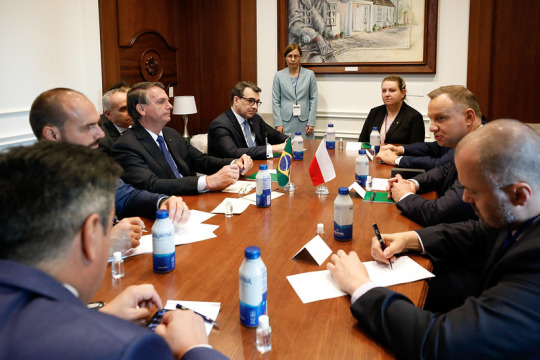
President Jair Bolsonaro on Tuesday met with the presidents of Ecuador, Guillermo Lasso, and Poland, Andrzej Duda, while in New York for the UN General Assembly.
Brazil and Poland signed two agreements. One on the exchange and mutual protection of classified information and the other on the elimination of double taxation on income and the prevention of tax evasion.
Yesterday, Under Secretary for Multilateral Political Affairs Paulino Franco de Carvalho Neto said at a briefing with reporters that Mr. Bolsonaro could also have sitdowns with Guatemala’s Alejandro Giammattei and Serbia’s Aleksandar Vučić, but a Foreign Ministry spokesperson today said conflicting schedules prevented those meetings from going ahead.
Mr. Giammattei is to address the UN General Assembly today. On Monday, he held a bilateral meeting with Paraguayan President Mario Abdo Benítez. Mr. Vučić has already arrived in the U.S. and will address the General Assembly tomorrow.
The Brazilian president left Brazil during the final stretch of the presidential campaign despite trailing behind in the polls. One of the goals of his trip abroad was to counter the perception that he is an international pariah.
Continue reading.
#brazil#politics#poland#ecuador#brazilian politics#jair bolsonaro#foreign policy#international politics#polish politics#ecuatorian politics#mod nise da silveira#image description in alt
0 notes
Text
Mango crop update from Brazil and Ecuador

[Image description: mango trees.]
On October 15, the National Mango Board published a Mango Crop Report, including shipment projections, actual arrivals, variety and size availability, and other figures considered useful to the US mango market.
Brazil and Ecuador are currently harvesting and packing. The Brazilian mango season began the last week of July and will run until the second week of December with a projection of approximately 13.1 million boxes. At the end of the week ending October 9, Brazil had shipped 1,091,444 boxes for a total of 8,086,459 boxes for the season. During the same week last year, volume shipped from Brazil was 1,091,699 for a total of 6,349,375.
The Ecuadorian mango season began the second week of September and will run until the last week of December with a projection of approximately 13.8 million boxes. At the end of the week ending October 9, volume shipped from Ecuador was approximately 707,479 boxes for a total of 1,469,758 boxes for the season. During the same week last year, volume shipped from Ecuador was 394,983 boxes for a total of 801,430 boxes for the season.
Continue reading.
#brazil#ecuador#politics#economy#food#brazilian politics#ecuatorian politics#farming#mod nise da silveira
6 notes
·
View notes
Text
Socioeconomic Integration of Venezuelan Migrants and Refugees: The Cases of Brazil, Chile, Colombia, Ecuador, and Peru
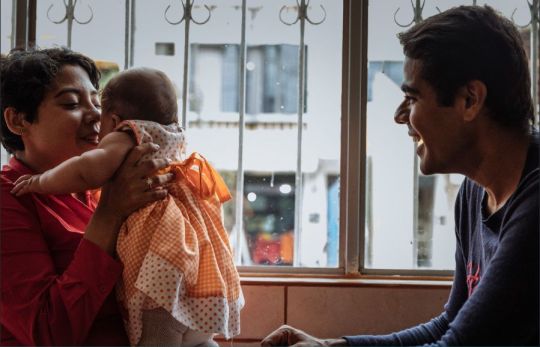
[Image description: a Venezulan woman, man, and baby.]
The socio-economic integration of Venezuelan refugees and migrants being hosted by countries in Latin America has been set back by the COVID-19 pandemic, according to a new study that examines key issues such as economic inclusion, social cohesion and access to education and health care.
The findings draw from a new analysis of Displacement Tracking Matrix (DTM) and other data by the Migration Policy Institute (MPI) and the International Organization for Migration (IOM). The report explores the progression of socio-economic integration of refugees and migrants from Venezuela over three periods between 2017 and 2021 in Brazil, Chile, Colombia, Ecuador and Peru, which host more than 70 per cent of the 5.6 million Venezuelans who have left Venezuela since 2015.
The report finds Venezuelans in the five case-study countries experience unemployment at higher rates than the receiving-country population, with many losing jobs during the pandemic. The public-health crisis also has taken a toll on newcomers’ income, with Venezuelans surveyed in Colombia, Ecuador and Peru last fall reporting a more than 50 per cent drop since the onset of the pandemic in March 2020. Irregularity has also been a significant obstacle to integration in Ecuador and Peru during the pandemic.
With more Venezuelans reporting in surveys their intention to remain in their receiving countries, the report underscores the need for governments to transition from short-term humanitarian responses to longer-term integration policies.
Continue reading.
#venezuela#politics#refugees#migration#brazil#peru#colombia#chile#ecuador#brazilian politics#colombian politics#peruvian politics#chilean politics#ecuatorian politics#international politics#mod nise da silveira#latin american politics
6 notes
·
View notes
Text
Big Oil seeks refuge in Brazil from Latin American regional turmoil

When executives arrive in Rio de Janeiro this week for Brazil’s biennial Offshore Technology Conference, they will find themselves in Latin America’s most promising market for Big Oil by far.
That marks a dramatic change from only a year ago.
In early October 2018, Brazil’s current president, Jair Bolsonaro, was in a tight electoral race with Fernando Haddad of the leftist Workers’ Party. Global executives feared a Haddad victory would reverse recent pushes to provide them an opening in Brazil’s oil industry, which for years had been dominated by state-run Petroleo Brasileiro SA, or Petrobras.
Elsewhere in the region, Brazil at the time had fierce competition in the race to attract capital.
Business-friendly governments in Argentina and Ecuador were auctioning exploration blocks and working to lure foreign oil companies.
Lopez Obrador, widely known as AMLO, halted a liberalization of Mexico’s energy market. Protests and economic crises have undercut Argentina and Ecuador’s would-be reformers.
By contrast, Bolsonaro has made dramatic strides toward expanding global energy firms’ role in Brazil — with over a dozen bidders in back-to-back oil auctions next week expected to fetch around $28 billion in signing bonuses.
“These are different markets, but the trend when you look at everything that’s going on, is that Brazil is held in high regard,” said oil and gas specialist Alexandre Calmon, a partner at law firm Tauil & Chequer.
Continue reading.
#brazil#brazilian politics#politics#economy#oil industry#latin american politics#mexico#mexican politics#ecuador#ecuatorian politics#argentina#argentinian politics#international politics#mod nise da silveira
2 notes
·
View notes
Text
South America leaders form Prosur to replace defunct Unasur bloc
The heads of Brazil, Chile, Argentina, and other Latin American states have created a new regional bloc, Prosur. It will replace Unasur, which was founded by late Hugo Chavez in a bid to limit US influence.
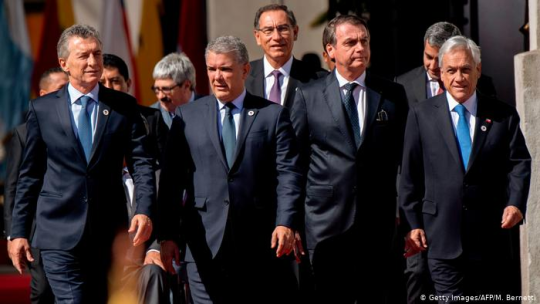
Seven right-wing presidents of South American nations gathered in Chile's capital Santiago on Friday to announce a new political association dubbed Forum for the Progress of South America, or Prosur.
The bloc would function "without ideology and bureaucracy, but with a total commitment to freedom, democracy and human rights," Chilean President Sebastian Pinera said.
Prosur includes Brazil, Argentina, Chile, Paraguay, Colombia, Ecuador, Peru and Guyana. Leftist governments in Bolivia and Uruguay sent representatives to the Santiago meeting, but did not join the bloc.
The alliance would allow the states to discuss infrastructure, energy, security, health, defense, crime, and response to natural disasters.
"Here, the countries of South America can exchange ideas, work together, make their voices heard and together achieve more freedom, integration and development," Pinera said.
Continue reading.
#brazil#brazilian politics#jair bolsonaro#chilean politics#argentinian politics#paraguayan politics#ecuatorian politics#argentina#peruvian politics#peru#guyana#guayanese politics#ecuator#paraguay#chile#forum for the progress of south america#colombia#colombian politics#latin american politics#international politics#politics#mod nise da silveira
5 notes
·
View notes
Text
So, in Brazilian fake news and political propaganda news, president Jair Bolsonaro has shared on Twitter a video in which alleged members of the Revolutionary Armed Forces of Colombia (FARCs) threaten him (and right-wing Latin American leaders such as Argentine Mauricio Macri and Chilean Sebastian Piñera), imply they're behind the protests that have taken part of the continent recently, and refer to leftist Brazilian ex-president Luis Inacio Lula da Silva as their commander. The video is most probably fake. Not only it's scaremongering, vague, and with no official sourcing, the spoken Spanish has very heavy accents, FARC members don't use masks in announcements and don't wear clothes like those in the video, they have their own flag but they're displaying an Ecuatorian one (while they'd allegedly be in Colombia), they claim to be from a dissident group but said group appears nowhere when their name is searched, and FARC has become an official political party and has not manifested any official interest in taking up arms again. Some of Bolsonaro's party colleagues have deleted the video after being informed it was fake. Bolsonaro hasn't.
#brazil#brazilian politics#political propaganda#fake news#politics#Revolutionary Armed Forces of Colombia#originals#mod nise da silveira
8 notes
·
View notes